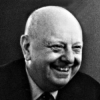Virgil Thomson

Virgil Thomson
Virgil Thomsonwas an American composer and critic. He was instrumental in the development of the "American Sound" in classical music. He has been described as a modernist, a neoromantic, a neoclassicist, and a composer of "an Olympian blend of humanity and detachment" whose "expressive voice was always carefully muted" until his late opera Lord Byron which, in contrast to all his previous work, exhibited an emotional content that rises to "moments of real passion"...
NationalityAmerican
ProfessionComposer
Date of Birth25 November 1896
CityKansas City, MO
CountryUnited States of America
I don't care what other critics say, I only hope to be played.
Every composer's music reflects in its subject-matter and in its style the source of the money the composer is living on while writing the music.
I never learned to verbalize an abstract musical concept. No thank you. The whole point of being a serious musician is to avoid verbalization whenever you can.
I got myself into a lovely little shall we say controversy with André Breton, by pointing out that the discipline of spontaneity, which he was asking his surrealist neophytes to adopt, was new for language but something that composers had been practicing for centuries.
The way to write American music is simple. All you have to do is be an American and then write any kind of music you wish.
Reviewing music or reviewing anything is a writing job. It's nice if you are experienced in the field you are writing about, but writing is what you are doing.
A libretto that should never have been accepted on a subject that should never have been chosen bya man who should never have attempted it.
I've never known a musician who regretted being one. Music itself is not going to let you down.
Try a thing you haven't done three times. Once, to get over the fear of doing it. Twice, to learn how to do it. And a third time to figure out whether you like it or not.
I listened to the pure crystalline notes of one of Mozart's concertos dropping at my feet like leaves from the trees.
Let your mind alone, and see what happens.
I seem to write an opera about every 20 years; if you live long enough you can write four operas. I finished my third in 1970.
In Paris, you learn wit, in London you learn to crush your social rivals, and in Florence you learn poise.
I said to my friends that if I was going to starve, I might as well starve where the food is good.